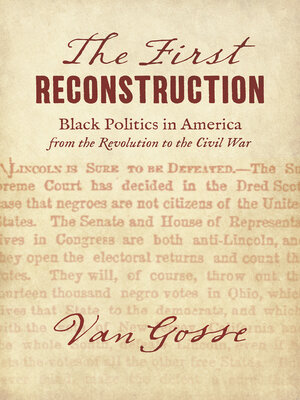The First Reconstruction
ebook ∣ Black Politics in America from the Revolution to the Civil War · The John Hope Franklin Series in African American History and Culture
By Van Gosse

Sign up to save your library
With an OverDrive account, you can save your favorite libraries for at-a-glance information about availability. Find out more about OverDrive accounts.
Find this title in Libby, the library reading app by OverDrive.



Search for a digital library with this title
Title found at these libraries:
| Library Name | Distance |
|---|---|
| Loading... |
It may be difficult to imagine that a consequential black electoral politics evolved in the United States before the Civil War, for as of 1860, the overwhelming majority of African Americans remained in bondage. Yet free black men, many of them escaped slaves, steadily increased their influence in electoral politics over the course of the early American republic. Despite efforts to disfranchise them, black men voted across much of the North, sometimes in numbers sufficient to swing elections. In this meticulously-researched book, Van Gosse offers a sweeping reappraisal of the formative era of American democracy from the Constitution’s ratification through Abraham Lincoln’s election, chronicling the rise of an organized, visible black politics focused on the quest for citizenship, the vote, and power within the free states.
Full of untold stories and thorough examinations of political battles, this book traces a First Reconstruction of black political activism following emancipation in the North. From Portland, Maine and New Bedford, Massachusetts to Brooklyn and Cleveland, black men operated as voting blocs, denouncing the notion that skin color could define citizenship.
Full of untold stories and thorough examinations of political battles, this book traces a First Reconstruction of black political activism following emancipation in the North. From Portland, Maine and New Bedford, Massachusetts to Brooklyn and Cleveland, black men operated as voting blocs, denouncing the notion that skin color could define citizenship.







